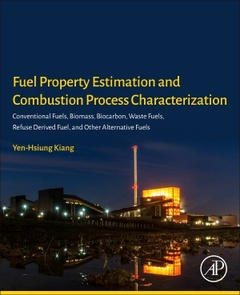Fuel Property Estimation and Combustion Process Characterization Conventional Fuels, Biomass, Biocarbon, Waste Fuels, Refuse Derived Fuel, and Other Alternative Fuels
Auteur : Kiang Yen-Hsiung

Fuel Property Estimation and Combustion Process Characterization is a thorough tool book, which provides readers with the most up-to-date, valuable methodologies to efficiently and cost-effectively attain useful properties of all types of fuels and achieve combustion process characterizations for more efficient design and better operation. Through extensive experience in fuels and combustion, Kiang has developed equations and methodologies that can readily obtain reasonable properties for all types of fuels (including wastes and biomass), which enable him to provide guidance for designers and operators in the combustion field, in order to ensure the design, operation, and diagnostics of all types of combustion systems are of the highest quality and run at optimum efficiency.
Written for professionals and researchers in the renewable energy, combustion, chemical, and mechanical engineering fields, the information in this book will equip readers with detailed guidance on how to reliably obtain properties of fuels quickly for the design, operation and diagnostics of combustion systems to achieve highly efficient combustion processes.
1. Introduction2. Basic Properties of Fuels, Biomass, Wastes, bio sludge and Biocarbons3. Data Base of Fuels, Biomass, Wastes, bio sludge and Biocarbons4. Analysis of Fuel Properties5. Estimate Higher Heating Value from Ultimate Analysis6. Higher Heating Value Estimation from Components of Trash7. Estimate Total Analysis from Higher Heating Value8. Combustion Process Calculation for Fuels, Biomass, Wastes, bio sludge and Bio carbons9. Combustion Process Characterization for Fuels, Biomass, Wastes, bio sludge and Bio carbons10. Biomass Combustion Fundamentals and Energy Systems
Thermal energy engineers, researchers, academics and graduates specializing in combustion, those involved in the design, operation and diagnostics of combustion systems, boiler designers and manufacturers, alternative fuel system designers. Engineering professionals and researchers, both in academia and industry R&D, designing, planning and operating bioenergy and waste to energy systems
- Presents models for quick estimation of fuel properties without going through elaborate, costly and time consuming sampling and laboratory testing
- Offers methodologies to determine combustion process characteristics for designing and deploying combustion systems
- Examines the fundamentals of combustion applied to energy systems, including thermodynamics of traditional and alternative fuels combustion
- Presents a fuel property database for over 1400 fuels
- Includes descriptive application of big data technology, using dual properties analysis as an example
- Provides specific technical solutions for combustion, fuels and waste processing
Date de parution : 02-2018
Ouvrage de 460 p.
19x23.3 cm
Thèmes de Fuel Property Estimation and Combustion Process... :
Mots-clés :
Acid dew points; Activated carbon injection; Adjusted coefficient of multiple determination; Alternative energy technology; Alternative fuel; Anaerobic digestion; Atomization; Big data; Biocarbon; Biocarbons; Biocharcoal; Biogas; Biomass; Biomass combustor; Biomass derived fuel; Biosludge; Biosludges; Bladeless wind turbine; Carbon dioxide; Carbon to hydrogen ratio; Carbonization; Ceramic candles; Characteristic value; Chemical equilibrium; Coefficient of multiple determination; Combustion; Combustion process; Combustion process characterization; Combustion thermodynamics; Confidence interval; Control dioxin emissions; Cooling tower; Correlation coefficient; Craya-Curtet; Data analysis; Data collection; Data mining; Data processing; Database; De novo synthesis; Dioxin; Droplet combustion; Dry anaerobic digestion; Dry scrubber; Dulong equation; Dyson Bladeless Fan; Eigenvalue; Elastic Net regression; Elementary analysis; Energy balance; Equilibrium constants; Eutectic point; Eutectic points; Ewicon; Exergy; Fate of metal; Flow diagram; Fossil fuel; Fuel; Fuel NOx; Fuels; Gas holder; Gasification; Gasifier; Greenhouse gases; Gross Calorific Value; Gross Energy Value; Gross Heating Value; Halides; Heat capacity; Heat of combustion; Heat of formation; Heating value; Higher Calorific Value; Higher Heating Value; Higher heating value; Incomplete combustion products; Iterative method; Jet penetration; Kinetic energy; Kitchen wastes; Lasso regression; Linear regression; Logistic regression; Lower Heating Value; Lower heating to higher heating ratio; Material and energy balance; Material balance; Mean absolute error; Mean absolute percentage error; Mean biased error; Mean biased percentage error; Microchip fuel; Mixing; Model development; Model scoring; Model validation; Multicollinearity; Net Calorific Value; Net Heating Value



